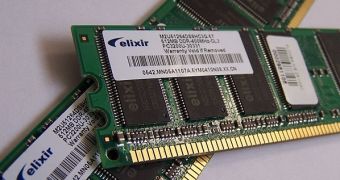While it's true that nobody can appreciate the value of DDR3 memory better than a hardcore overclocker, keeping average users from reaching dazzling memory speeds might be regarded as an injustice. Fine tuning memory modules is not an easy to achieve task, and less experienced users who try to squeeze the last bit of performance usually manage to get their memory modules belly up.
The advent of the EMP and XMP technologies made overclocking more hassle-free than ever before. However, both standards offer their advantages, but no memory manufacturer managed to implement both of them on the same product.
According to Terry Groth, a Product Marketing Manager at Crucial Technology, quoted by tech site BitTech, manufacturing memory modules that support both EPP 2.0 and XMP is possible, but building modules with both Nvidia's and Intel's extended memory performance profile standards "would be a branding nightmare." However, since Nvidia and Intel are continuously competing in the chipset business, the integration of both technologies is highly unlikely to ever happen.
Enhanced Performance Profiles (EPP) is a memory technology developed by Nvidia and is a feature of the nForce 5 and nForce 6 chipsets. Developed in cooperation with memory manufacturer Corsair, the technology requires support from both the motherboard and the memory module. EPP can handle clock speed, CAS latency, tRCD, tRP, tRAS, memory voltage, and command rate, while a fully enhanced profile will be able to handle drive strengths, fine delays, setup times, write recover time, and tRC. Its backers call the EPP-ready memory modules as "SLi-ready memory".
The XMP format has been brewed by Intel in collaboration with memory manufacturer OCZ, and comes as a performance expansion of the standard DDR3 memory specifications. XMP allows users to select the appropriate profile rather than adjusting each individual parameter in BIOS.

 14 DAY TRIAL //
14 DAY TRIAL //